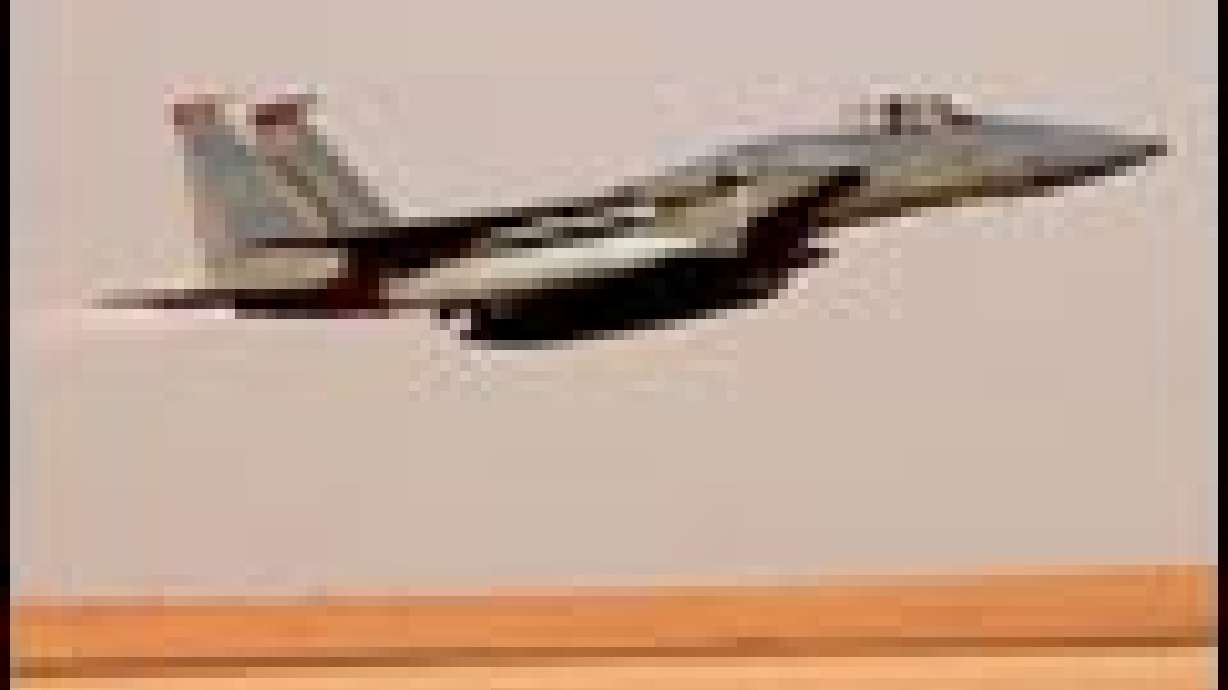Estimated read time: 5-6 minutes
This archived news story is available only for your personal, non-commercial use. Information in the story may be outdated or superseded by additional information. Reading or replaying the story in its archived form does not constitute a republication of the story.
(AP) Warplanes attacked a convoy of Iraqi armored vehicles leaving Basra under cover of sandstorms Wednesday, raising hopes that British ground troops could soon enter a city feared on the verge of a humanitarian crisis. Iraq claimed American missiles killed 14 civilians in Baghdad.
The possibility of a major battle loomed south of the capital as a second, far larger, Iraqi column of vehicles moved in the direction of American forces aiming for Saddam Hussein's seat of power.
One week into the war, the first substantial delivery of humanitarian supplies rolled into southern Iraq, greeted at the border by hungry children.
"This war is far from over," President Bush said in a quick trip to the Florida headquarters of U.S. Central Command, which is overseeing the war. Still, he said victory was only a matter of time, adding, "There will be a day of reckoning for the Iraqi regime, and that day is drawing near."

The Iraqis countered with a military communique of their own -- nothing like Bush's assessment -- reporting an unbroken string of successes.
For the second straight day, swirling sandstorms hampered American units. The bombing campaign was crimped, as well, but Baghdad television was knocked off the air for several hours, and explosions were heard, as well, near the oil-rich city of Kirkuk in the north.
Harriers and Tornado jets flying out of Kuwait attacked the Iraqi convoy leaving Basra, a city of more than 1 million people in southern Iraq, according to a British military source. The source, speaking on condition of anonymity, said the column included as many as 120 vehicles, tanks and other armored vehicles.
Irregular Iraqi troops have prevented British troops from entering Basra, Iraq's second-largest city and site of a reported uprising by local civilians against Saddam's defenders. International aid officials have repeatedly expressed fears of an outbreak of disease, given the interruption of power and water supplies.
The British hit Iraqi positions in the city overnight, and said they had silenced the mortar fire being directed their way and possibly at civilians in the city.
Details were sketchy, as well, about Iraqi troop movements to the north. Some officials said a huge convoy of perhaps 1,000 vehicles and members of Saddam's elite Republican Guard were moving south, in the direction of Marines making their way toward the capital of Baghdad.
But Brig. Gen. Vincent Brooks, briefing reporters in Qatar, said, "We've not seen any significant movements of the type of force" described. He added, though, there were "local positionings and survival positionings" of various units.
Intelligence officials offered a different possibility, that paramilitary fighters, so-called Fedayeen, had been moving in recent days, traveling in pickup trucks, SUVs and other civilian vehicles.
U.S. officials blame the Fedayeen units for much of the resistance that has hampered the American-led advance through Iraq, accusing them of faking surrender only to shoot Americans, using human shields, or enforcing discipline among regular Iraqi army troops who may be less willing to fight.
One Defense Department official said commanders were surprised by the Fedayeen's capability and that, as a result, military commanders were changing their tactics, making a great effort to defeat the Fedayeen, rather than bypass them on the way to Baghdad.
"We're going into a hunting mode right now," said Marine Lt. Col. B.T. McCoy in Iraq.
The Fedayeen wasn't the only problem encountering Marine and Army units aiming for Baghdad. Swirling sand grounded helicopters and forced cancellation of some combat aircraft runs.
Visibility was so poor that some troops attached themselves by string to their Bradley fighting vehicles -- a precaution against becoming lost when they walked to bathrooms a few feet away.
Iraqi officials said 30 civilians were injured, some badly, when two American missiles landed in a residential Baghdad neighborhood of homes and small shops.
Associated Press Television News video showed bodies wrapped in plastic sheeting in the back of a pickup truck and streets that had flooded after water pipes ruptured. Flames rose above the burning buildings, mixing with smoke from fires Iraqis have lit to try to obscure targets for American combat pilots.
American military officials issued a statement saying that civilian damage was "possible" after an aerial attack aimed at nine Iraqi surface-to-surface missiles. "The missiles and launchers were placed within a civilian residential area," it said.
The first sizable relief convoy rolled across the border toward the southern port city of Umm Qasr, laden with water, boxes of tuna, crackers, sweets and other food.
Children greeted the trucks as they rumbled into Iraq from Kuwait, including a boy of about 10 who pointed to his mouth and shouted "Eat, eat."
In the border town of Safwan, the arrival of a relief convoy from the Kuwait's Red Crescent Society triggered fighting among young Iraqis, some shoeless and dirty, over the white boxes of supplies.
Bush was greeted with enthusiasm by hundreds of members of the armed forces on his trip to MacDill Air Force Base, home of the U.S. Central Command.
He offered a bullish account of the war effort to date, saying U.S. and British forces "have taken control of hundreds of square miles of territory to prevent the launch of missiles and chemical or biological weapons."
Even so, he tempered his prepared remarks, according to one official who spoke on condition of anonymity, deleting a phrase that said the operation was "ahead of schedule.' Bush is aware, this official said, that humanitarian supplies did not flow within the 36-hour timetable he set Sunday, and that Iraqi tactics and resistance are tougher than military planners had hoped.
(Copyright 2003 by The Associated Press. All Rights Reserved.)








